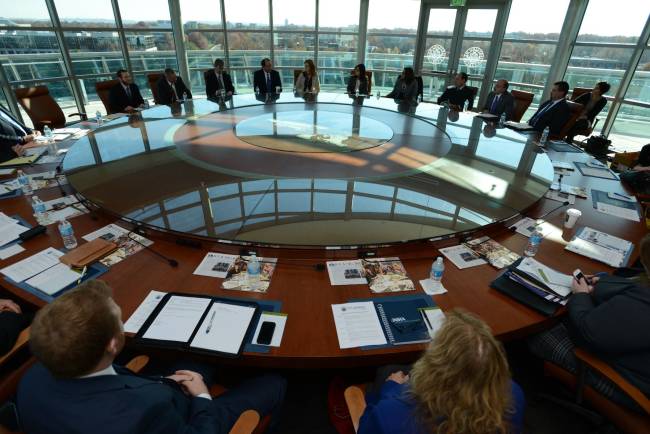Kean broke the law when purchasing lavish table, state report says

Kean University’s $250,000 table sits in the sixth floor of the Green Lane Academic Building. Photo courtesy of Kean University
By Rebecca Panico | Published June 2, 2016
A state Comptroller’s report showed Kean University broke state law and its own internal policies when purchasing a lavish $250,000 table from China that sits in the sixth floor of the Green Lane Academic building.
More: Read the full report
President Dawood Farahi “gave the green light” to officials at the Wenzhou Kean University (WKU) campus to purchase the table on behalf of the U.S. campus before getting approval from the Board of Trustees, the report found.
The report found that the total cost of the table was $250,000, including a $30,0000 life-sized plywood model and modifications to make the table smaller once it was installed. The U.S. campus reimbursed WKU with some creative accounting: It paid for the cost of the table by deducting from the WKU payroll rather than paying a bill to them directly.
Public universities are typically required to publicly bid on expensive items to get the lowest price possible, but exceptions are sometimes allowed. The Comptroller’s Office deemed that the two exceptions Kean cited to circumvent the public bidding process and purchase the table directly from China were not justified.
Kean pushed back against the findings in the report, saying that it “has significant omissions that explain Kean’s actions” and maintained that Kean officials “acted legally and with transparency throughout the process of developing” the conference table.
In its response, Kean said that they didn’t technically purchase the table until December 2014 — several months after the Trustees approved it — since their payroll deductible for WKU didn’t kick in until then. However, a contract was made between the two universities and WKU paid 60 percent of the cost to the Chinese manufacturer months before the Trustees gave approval.
More: Read Kean’s response to the report
The Trustees approved the purchase and the bid waiver on May 12, 2014, by which point the table was already on a boat headed to the U.S., the report said.
Farahi told the Comptroller’s Office that if the Trustees did not approve the purchase, the table would have been sent back to the Chinese campus and they would have remained financially responsible for it. The Trustees were not informed of this agreement and it was not in the contract between the two campuses, the report said.
Kean stated that a conference center was envisioned for sixth floor of the Green Lane Building when it was built. Several smaller tables were originally planned for the space, the report said, but the idea for one big, table with electronic capabilities was conceived by Farahi.
Philip Connelly, vice president of Kean, issued a statement to all students, faculty and staff yesterday about the benefits of the table , stating that it has been used for events including policy discussions on solitary confinement, as well as receiving several Chinese officials like Consul General of the People’s Republic of China, and hosting multiple municipal agencies.
Farahi told the Comptroller’s Office that that his idea for the conference table was inspired by similar tables he had seen while travelling in Wenzhou, China and Denmark. He said that the original plan did not match the aesthetic of the circular room.
Farahi also said there was a “vanity” component to the table that could also be used to attract potential donors, the report noted. A Kean official also interviewed by the Comptroller’s Office said it was “a nod to our partners in China.”
William F. Loehning, a Kean alumnus, recently donated $250,000 to cover the cost of the table. The room where the table sits now has his namesake. The table has generated $22,000 in revenue from rental costs for the university since its installation, the university said late last year.
The state Comptroller’s Office was created to investigate public agencies, but has no legal authority. They can only make suggestions for institutions like Kean to improve upon.
The Comptroller’s Office made six suggestions. They are as follows:
• Ensure that all University staff and Board members understand their responsibilities with regard to purchasing goods and services
• Require that all necessary approvals from the appropriate departments and the Board be obtained before Kean officials or their agents are permitted to enter into a contract on the University’s behalf
• Confirm that purchase orders are issued and that vendors provide the University with required documents before issuing payment
• Utilize public bidding in accordance with the State College Contracts Law in order to foster competition and benefit from potential cost savings
• Refrain from alternative payment arrangements for purchases and ensure compliance with University practices and procedures
• Ensure that all monies expended for goods and services are the result of a reasonable and organized strategy designed to obtain the best value for the University
Rebecca Panico may be reached at panicore@kean.edu. Follow The Tower on Twitter@KeanTower. Find The Tower on Facebook.

You must be logged in to post a comment.